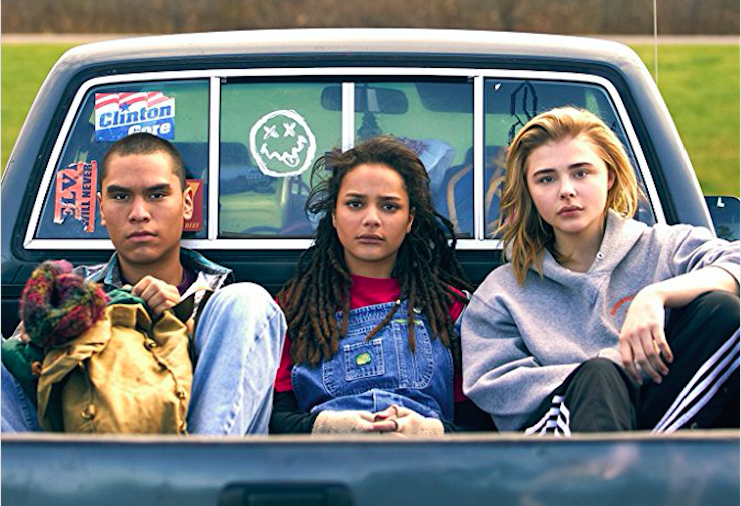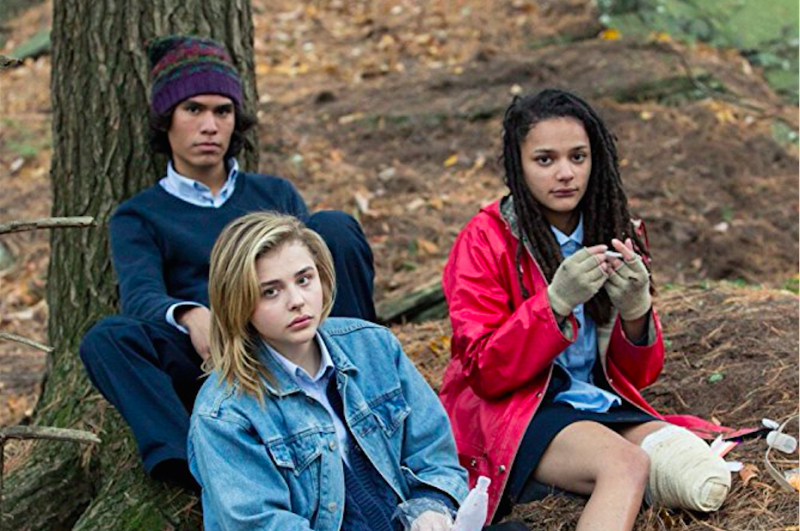Based the last portion of the novel by Emily Danforth, The Miseducation of Cameron Post, up-and-coming director Desiree Akhavan tells the story of gay teen Cameron (Chloë Grace Moretz) as she’s sent to a Christian conversion center by her orthodox family in the 90s.
The dreamy, warmly lit visuals of Cam’s fantasies and memories contrast the starker, colder realists of the God’s Promise camp, run by Dr. Lydia Marsh (Jennifer Ehle) and her ‘ex-gay’ brother Reverend Rick (John Gallagher Jr.). The pair of them are a remarkable duo, displaying a good-cop/bad-cop approach to their mission to ‘help’ the teens fight the ‘sin’ of SSA (same-sex attraction). Their rhetoric is obviously awful to listen to, but in the emotionally deprived and self-hatred encouraging context of the camp, you can easily see how some of the teens are taken in by it. Ehle is simply sinister and easy to hate, while Gallagher’s earnest vulnerability evokes pity more than hatred.

After the likes of Kick-Ass, it’s a welcome change to see Moretz tackle a role that requires more emotional nuance, which she actually handles well. The journey Cam undertakes is a rocky one, and for the most part, Moritz is convincing at carrying it — there are just a few moments where it’s hard to believe.
At the camp with her are a quirky combination of young people all at varying stages in their ‘miseducation’. Cam’s by-the-book, ‘wants to get better’ roommate Erin (Emily Skeggs) is one of the most understatedly powerful characters of the piece, while American Honey’s Sasha Lane and Native American actor Forrest Goodluck play the cool kids Jane and Adam.
In a somehow both humorous and desperately sad montage of what in their pasts each of the students assigns as being the root cause of their SSA, we see Jane growing up in a hippie commune, and Adam reveling in his culture which encourages his two-spirit, gender non-conforming identity. Their cases present Christianity as a colonialist force, imposed upon them by new religious stepfathers, or fathers who are running for office so must clean up their image — a decidedly different perspective from the other white, Christian students whose genuine devotion to the Bible is used as a tool by the school.
Jane has a prosthetic leg — the result of a car accident in her youth — and both this and her and Adam’s races and cultures are included in a way that ensures this LGBT film presents an intersectionally relevant story. Cam’s story is not taken to be the default, despite her being the lead, and it is the collective experiences of the students that make up the power of the film.

There are some incredibly dark moments that certainly play into the age-old stereotype of all gay films being full of tragedy, but the film manages to balance humor and sobriety in a way that truly honors the struggles of LGBT youth who do undergo experiences like this. It’s a difficult debate to resolve — the existence of the gay teen rom-com Love, Simon doesn’t invalidate the exploration of the darker side to stories like Cameron Post.
It isn’t all tragedy, but it would do a disservice to the very injustice and oppression the film portrays to brush over the brutality that occurs as a result. Alongside this, though, the irrepressible teen spirit of our core trio — their sarcasm and jokes and hidden weed spots — all are just as valued in this rounded picture of what it’s like growing up as a gay and gender non-conforming kid in a conservative society.
The ultimate message is one of hope and defiance, but there’s no easy good-beats-evil way to end the film — just as there isn’t a simple way to end homophobic prejudice in real life. The film allows space for interpretation in its numerous contemplative silences, and the result is a film that’s both powerful and empowering.